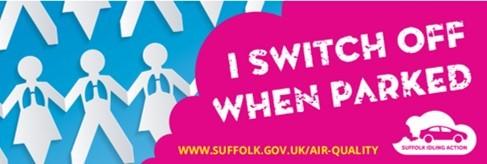What is idling?
Idling is when an engine is left running when the vehicle is not in use.
Why is idling bad?
When the engine is idling you're wasting fuel and adding pollution into the atmosphere, including CO2 emissions which contribute towards climate change.
Air pollution is a major environmental risk to health, and it is estimated that it contributes to around 36,000 deaths a year nationally. See our section on Health for more information about the impact air pollution has on our health.
It also costs you money by increasing wear and tear on your engine and increased fuel costs.
Research commissioned by Global Action Plan (GAP) and the UK Health Alliance on Climate Change said passengers in cars breathe in nine times as much pollution than those completing the same journey on a bike or by foot.
Interesting facts about idling:
- Idling is a significant contributor to local air pollution. It is less polluting to turn your engine off and restart it after a minute or longer than to leave your engine running.
- Modern batteries need less engine running time to work and don’t need the engine on constantly to keep them charged.
- Idling dirties your engine with incomplete combustion increasing wear and tear. Maintaining your vehicle is important for preventing breakdowns and reducing air pollution. Modern cars have much better ignitions and can be turned on and off without unnecessary wear on the engine.
- Catalytic converters retain their heat for about 25 minutes after an engine is switched off. You don’t need to keep the engine switched on for them to work properly.
- It can take up to an hour for an engine to cool down. Turning off your engine but keeping the ignition on and the fan blowing will provide warm air for some time.
- Walking or cycling on roads with less traffic can reduce your exposure to air pollutants by 50% or even more.
What can you do?
If you have to drive, follow the tips below to help stop idling:
- Many newer cars automatically turn off when stationary and in neutral. If yours doesn’t, turn off your engine when you’ve stopped for a minute or so. When you first start the car, drive off as soon as possible. It will warm up faster when the engine is in use. If your car is fitted with a stop start feature please ensure that this is switched on.
- You may have friends, family or neighbours who also drive their children to the same school or one nearby. Why not take turns to drive or walk the children to school? If you don’t know anyone who lives near you, why not check whether your school has a travel plan. If you arrive at school a little early – don’t sit in your car with the engine idling and/or your air conditioning running continuously – switch your engine off; you’ll save fuel, money and improve local air quality!
- Spread the word by helping us share our message. Feel free to download the resources at the bottom of this page to help with this.
So please, be an idol, don’t idle.
Join the Suffolk Idling Action Campaign

Anti-idling events are behaviour change campaigns which help reduce localised air pollution caused by motorists who leave their engines running when parked. Ipswich Borough Council has worked with other organisations to educate the public on this issue.
Our approach is to invite drivers to join our campaign and switch off their engines when parked. When approached in a friendly way, we find that over 80% of drivers switch off when asked, and many pledge to give up the idling habit for good.
Our Air Quality Officers are happy to visit and support schools, community groups and businesses running an anti-idling event. Please get in touch if you would like an officer to support you with an event: environmental.health@ipswich.gov.uk
Free downloadable resources
Access a range of free posters, toolkits, and information designed for use in schools, businesses, and community groups:
